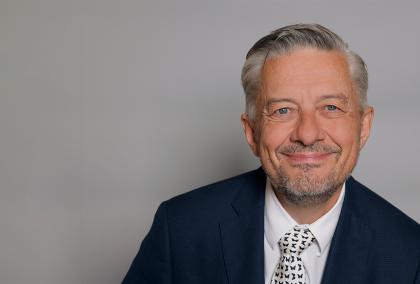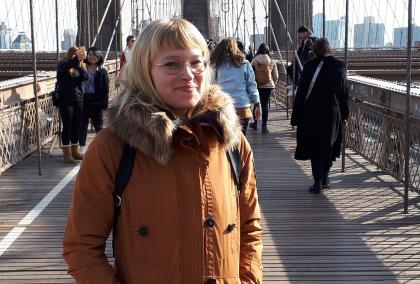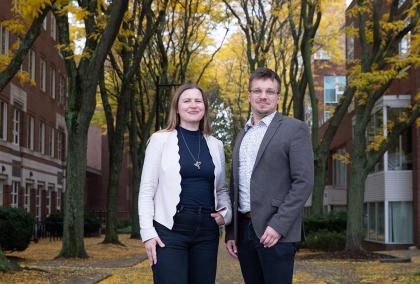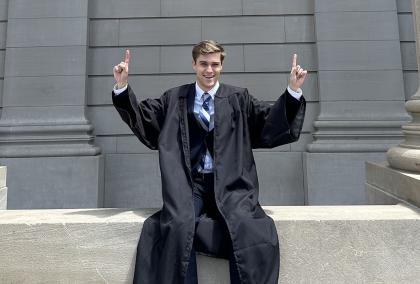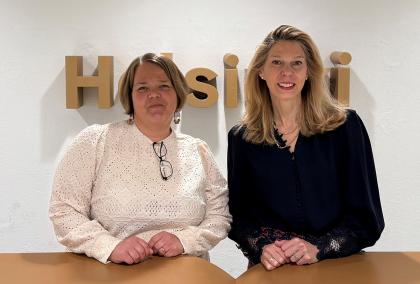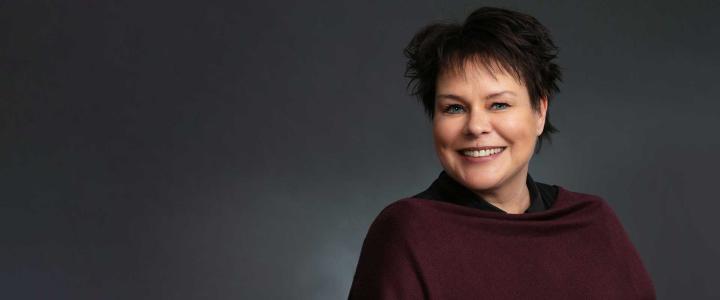

"I instantly fell in love with the field of North American studies because it didn’t operate within disciplinary boundaries,” says Professor Benita Heiskanen. “Instead of studying only literature, or political science, or history, you look at a phenomenon and then you take the tools that are necessary to study that phenomenon.”
Benita was studying for an undergraduate degree in English Philology, specializing in U.S. writers, but decided also to take minors in American studies, media studies and anthropology. “People told me at the time that it was a crazy combination, and that it wouldn’t prepare me for a specific career. They said you won’t become a teacher, an interpreter, or a linguist. But I didn’t want to be any of those things. The multidisciplinary approach had me hooked, and so I just went with it.”
Now Professor of North American Studies and Director of the John Morton Center at the University of Turku, Benita has built a successful career by developing this multidisciplinary approach. She credits her Fulbright scholarship as a turning point, allowing her to join the American Studies doctoral program at the University of Texas at Austin, gaining her PhD in 2004.
I know ‘life-altering’ is a cliché, but the Fulbright scholarship changed my life both personally and professionally.
Collegiality and Dialogue
“I know ‘life-altering’ is a cliché, but the Fulbright scholarship changed my life both personally and professionally. The doctoral program at the University of Texas at Austin was one of the most prestigious programs in American studies in the nation, and one of the oldest ones as well. It felt almost like a family because it’s such a small field – there were only twelve graduate students that got in the program that year. There was this tremendous sense of collegiality.”
During her time in the U.S., Benita achieved academic success, winning three graduate student paper awards, and became actively involved with the wider Fulbright community, as president of the Austin Fulbright Scholars Association from 2002 to 2004. She recalls meeting other Fulbrighters from across the world. “We went to New Orleans for a seminar organized by the U.S. State Department. We met with the mayor and had lunch on a historic steamboat. The way we were received was remarkable. For me, it was the equivalent of being in the Olympic Games, bringing all the best and the brightest together, sharing ideas. I really felt like I was walking on water.”
This collegiality is something that Benita has sought to foster in her role as Director of the John Morton Center, a position she took on in 2014. “In the U.S., I learned the importance of dialogue. In Finland, sometimes people just work in their offices, and you don’t know what’s going on next door. One of the key ideas I tried to get across from the beginning at the Center is that we always read and comment on each other’s texts and applications. We rarely publish anything without sharing it first, and it’s been wonderful to have that kind of dialogue and sense of community.”
One of Benita’s key research areas is the question of gun legislation in the U.S., specifically the controversial “campus carry” law passed in Texas in 2016, which allows the carrying of concealed firearms in university buildings. “There was a lot of media attention, and a huge uproar in Texas with activist movements opposing the legislation. We went there to conduct interviews and analysis with faculty, staff, and students, and the people who were on the implementation committees, about how they experienced the law on campus. Our group was multidisciplinary, including perspectives from security studies, gender studies, urban studies, and cultural history.”
Engaging with the Media
Benita’s expertise in such high-profile and controversial issues in American society, particularly in the wake of mass shootings, has led to regular invitations to comment in the Finnish media – she estimates she and her colleagues have participated in over 600 media interviews. “I think commenting in the media is particularly important in American studies because so much of what is going on in the United States is often either simplified or examined from a monodisciplinary viewpoint. For example, during presidential elections, American studies researchers can show how social power relations, such as race, class, and gender, become important in politics. We can explain how the abortion question, or the gun question, are matters that impact people’s lives as well as politics. We try to go beyond stereotyping to explain the complexities of U.S. society. We can bring in our expertise from that multidisciplinary phenomenon-based approach and help to explain why the United States is the way it is, beyond clichés and beyond simplifications.”
“It can get overwhelming, so I try to have very clear boundaries for when I participate in media debates. Our rule of thumb at the Center is we’ll participate if we can bring an analytical perspective that goes beyond what reporters can find just by Googling, or soundbites reported in yesterday’s New York Times. Journalists usually want you to simplify things, to give a catchy quote. But scholars want to complicate things, to look at both sides, and to highlight there are no easy answers.”
Benita has recently been asked to comment on the U.S. midterm elections. Does she have any insights into the results and what they may indicate in the longer term? “I studied the exit polls when they came out, and they seemed to indicate quite clearly that regular people are tired of the extremist viewpoints, and that the majority were hoping for a more moderate politics. Also, people were not voting strictly along party lines. For example, on the issue of abortion, they would jump out of a strictly partisan thinking. People have been talking about polarization for years, but that suggests that over 330 million people could be dumped into two boxes. People are much more varied than the bipartisan structure suggests, and I think this election is a clear example of that, that people vote based on their values. It’s clear from the exit polls that people want to see more political parties, as well as younger representatives in the government.”
Sharing Ideas through Collaboration
In addition to working with media organizations, Benita and her colleagues participate in a wide variety of research and public engagement events and networks throughout the year, even appearing on stage at the Turku City Theater to talk about her work to a public audience of 600. The Center’s mission, Benita explains, is to foster transdisciplinary dialogue and synergies by engaging not only with other researchers, but also with the public.
“The Center has a council that includes twenty-five people from all walks of life, including the Finnish Ministry for Foreign Affairs, the U.S. Embassy, the Fulbright Finland Foundation, other foundations, business, and NGOs that work with the United States, and organizations related to Canada and Mexico. Whenever there is something going on in the United States, not just elections, but other issues relevant for broader audiences, we try to organize meetings or webinars open to the public.”
Among the Center’s many collaborations, the Fulbright Finland Foundation is a key partner. “We work regularly and closely together. For example, Fulbright organizes the American Studies Roundtable every year in Helsinki. They bring people who work in American studies from different Finnish universities together to discuss what’s in store for the coming year, to share ideas and brainstorm about the future. Together with Fulbright, the English department here in Turku co-organizes the annual American Voices seminar, inviting all the Fulbright grantees that year to come to Turku and talk about American culture and experiences with a public audience, and we are partners in that. We also organize conferences where Fulbright is a partner, and our students often apply for Fulbright grants. I have a PhD candidate who recently got to spend a year in Texas with a Fulbright scholarship.”
“There are very few scholarships in the United States that are as prestigious as Fulbright. When you are in the U.S. with Fulbright, people look at you differently. They automatically assume that you’re a future leader of the world in some capacity. For me, Fulbright opened up so many different avenues, not just in terms of scholarship but also attitude, learning to be part of a scholarly community, sharing ideas and seeking help. There was a great sense that we’re in this together.”
Read the whole Fulbright Finland News 2/22!
